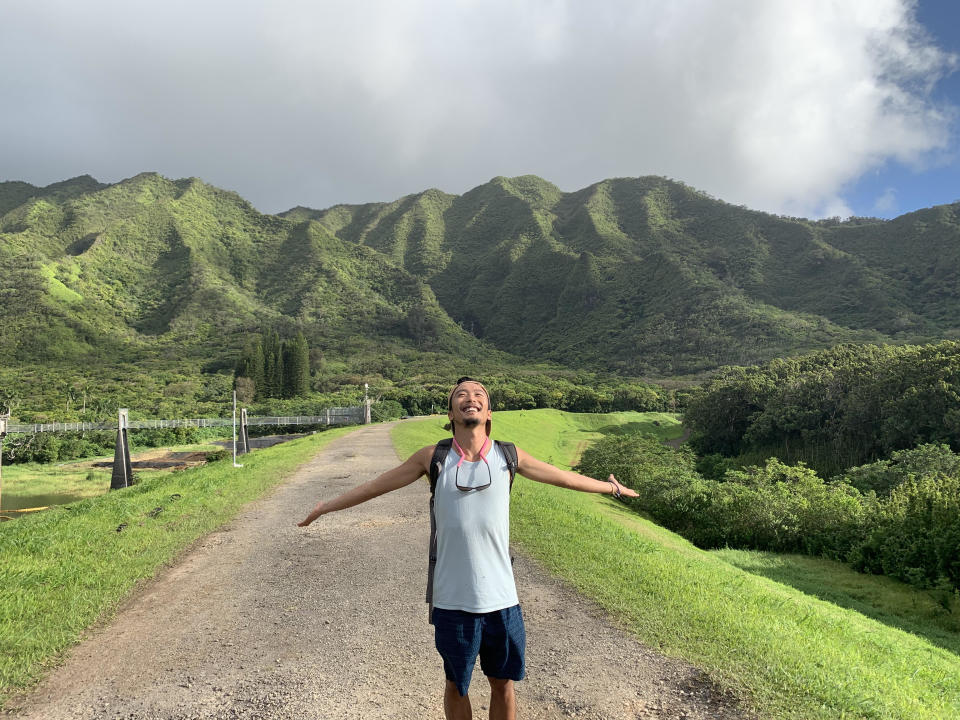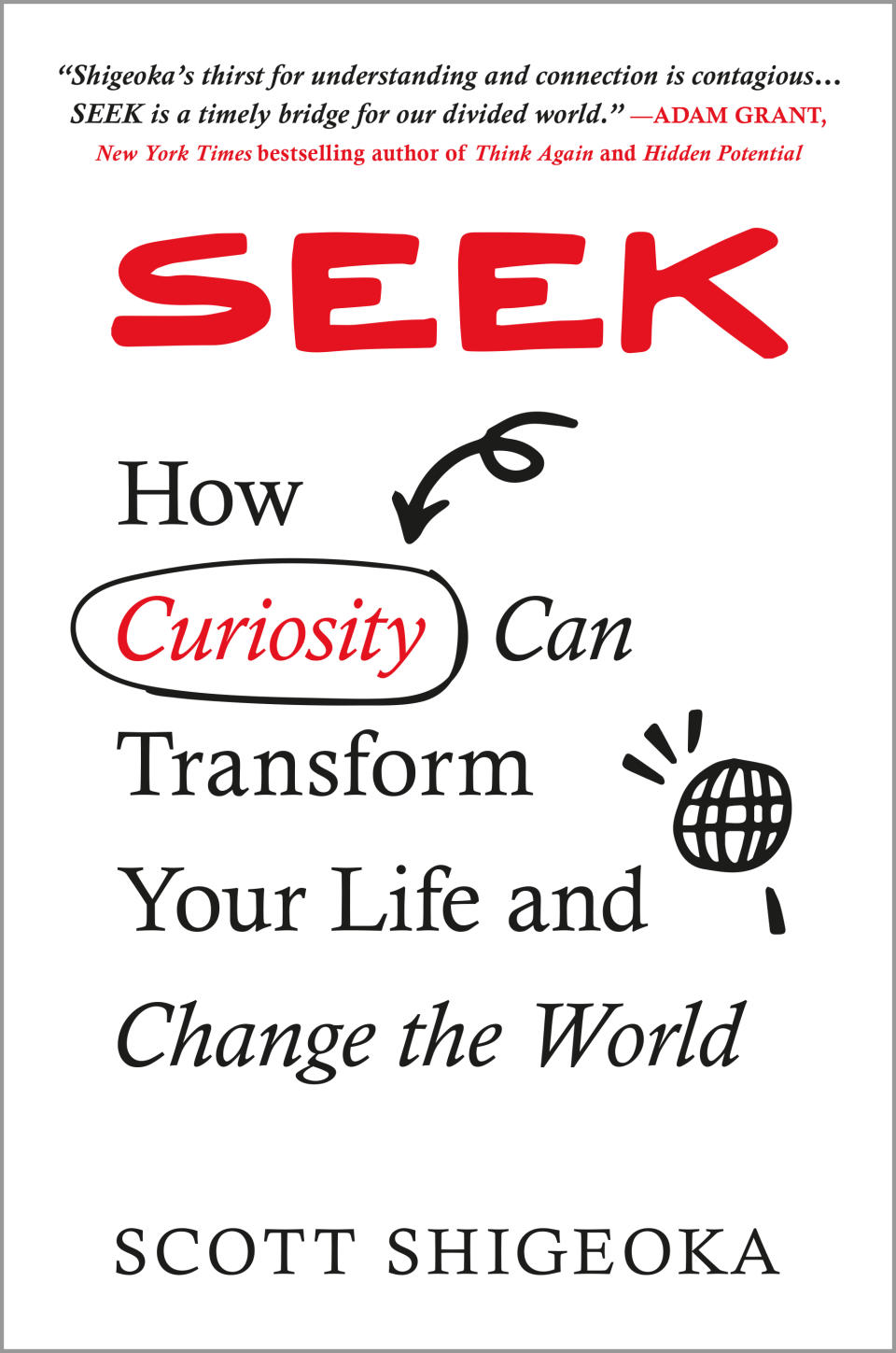Let’s consider the power of curiosity.
In his research work with the Greater Good Science Center in Berkeley, Calif., Scott Shigeoka, a curiosity expert and author of the new book “Seek: How Curiosity Can Transform Your Life and Change the World,” spent five years delving into how curiosity might help us bridge social and political divides.
“As a city-dwelling, liberal, Asian-American, spiritually queer professor and researcher from Hawaii, living in San Francisco, who often dresses flamboyantly, I know deeply what it means to be reduced to assumptions based on who I love, or what I look like,” Shigeoka, 35, says.
“I wanted to learn more about how we use curiosity to strengthen our relationships, bring our happiness to our lives, to reach across differences,” he told Yahoo Finance.
His method: a yearlong, thousand-mile cross-country trip behind the wheel of his Prius, spending time in a myriad of locales — small towns in Alabama, a Trump rally in Minnesota, and an indigenous reservation in Minnesota, to name a few.
The big takeaway: “At the heart of the division and disconnection so rampant all around the world is a lack of curiosity,” he said. “When we turn away from one another, we operate from assumptions and biases. We’re more likely to dehumanize a group, which makes it easier for us to fear or hate those people.”
Here’s what Shigeoka recently told Yahoo Finance in an interview about why curiosity can make us happier and freer, both at work and in our personal lives, edited for length and clarity:
Scott, why the road trip? Even your friends were a little worried about you out there.
A big part of the research is to live it out. I didn’t want to be in my ivory tower. I wanted to practice using what I was finding in the research.
Can curiosity make our lives better?
When you’re more curious, you’re happier. You tend to have stronger and higher-quality relationships that give you meaning and give you a sense of joy, and in which you feel connected to people around you.
Curiosity reduces anxiety and depression. There seems to be a connection between those two. In this mental health crisis that we’re all going through, the social isolation crisis, those metrics are all really very important.
In the workplace, the research shows that curiosity is a trait that people are looking for from their leaders. Curious leaders are more attractive to work for. They’re more liked and they’re seen as more competent. Curious teams tend to be more creative and more collaborative and more innovative as well.


I know during your travels you connected with a melange of cool entrepreneurs. How can curiosity help us launch and succeed with a startup?
Curiosity is pivotal for business owners. First, you have to be curious about yourself: What is it that you’re really good at? What are the things you’re not good at that you might want to invite other people to support you with? What does the world need? What are you passionate about? What do you think would excite you to make you feel alive in terms of work?
Those are the self questions. Then you also have to go out into the world and get curious about what others are doing. Where’s the gap in the field?
Oftentimes the problems that entrepreneurs have have already been solved by many other people. It’s not actually a question of invention. It’s really about discovery, and finding the people who have experienced the same things that you’re going through right now that you can learn from.
Curiosity helps us to establish and also strengthen strong relationships with people that we work alongside. And so if you want to have employees who show up and that care about you and each other and the work that you’re doing, if you want clients that are feeling connected with you as a person, you have to be curious about them.
I write a lot these days about multigenerational workplaces. How can curiosity help create successful multigenerational communities in the workplace?
Staying relentlessly curious rather than operating from assumptions of, oh, this person’s young, or this person’s old, so I know everything I need to know about them and what they can and can’t do is going to set you up for failure.
Instead of coming from a place of assumption and judgment, come from a place of curiosity and listening and sensing what it is that people can offer. What is the value that they bring to the table? What are the things that they want to learn that they can learn from you?
It helps to be curious about who your co-workers are. Get to know who they are as a person, what their interests are, what their preferences are, what they value, the people that are important to them in their lives, those kinds of insights are key and take time to develop, but the research shows when you are truly curious about someone else it reduces hostility and it increases empathy.
In other words, you’re able to better understand who someone is, and you’re able to better work alongside them.
Tell us about how curiosity can help us with the fear of change, say a new job or a career transition or becoming an entrepreneur.
You can replace fear with curiosity. You can replace your anxiety with curiosity. You see that it actually opens you up rather than contracts. It creates a sense of possibility. It gives optimism, hope, and excitement.
Curiosity can help us to progress and move forward. The best leaders tend to be relentlessly curious or students of life. They’re always learning, and they’re always encouraging others around them to constantly discover and learn new things. The world is changing so rapidly, we need to be constantly attuned to what’s happening both inside of us and also in the world around us.


Scott, I love hiking for miles in the country with my dog. It energizes me. What can nature teach us about curiosity?
When I work with folks, especially in corporations or leaders, oftentimes they’re disconnected from nature — a place where you can feel a sense of awe and a sense of curiosity. When you’re out looking at a huge valley of trees, or you’re out watching the northern lights above you, or you’re looking at the stars, you get out of your own ego and you recognize that the world is so big, and that there’s so much possibility.
At leadership retreats, I invite folks to take off their shoes and socks and to actually walk on grass. Many of these leaders have said, “I haven’t done this in years.” What that’s doing is exercising their observational skills. It’s exercising their ability to focus. It’s helping them to acknowledge that they’re more than just themselves, that there are other life forces around them that they can learn from and that they’re connected to.
Is there such a thing as too much curiosity?
You can definitely veer into nosiness, invasive curiosity. Just because you’re curious about someone’s hair or culture or whether they’re pregnant, that doesn’t mean that you’re entitled to that information.
Three questions I always give to people to sense whether they’re being curious or nosy is: Am I the right person to be curious? Is this the right time to be curious? And, do I know when to slow down?
Some people think they’re being curious, but they’re actually engaging in what I call predatory curiosity, which is when you’re asking questions for an ulterior motive. Maybe you’re asking questions only to then share your own point of view. You’re asking a question because you want another person to ask you the same question. That’s not real curiosity.


When I give older job seekers advice about going to interviews, one of the things I always tell them is to try to use the word curiosity whenever they can because it instantly gives a hiring manager the impression that you’re willing to learn new ways of doing things, that you’re not set in your ways and that you’re open to working in a different way or learning more about the business. Thoughts?
I totally agree with that. People who have a beginner’s mindset, who are curious and are constantly asking questions and are great listeners, are the best kind of people to work with because they’re constantly learning, they’re constantly growing. They’re going to make other people feel seen and heard in their contributions and perspectives.
That’s true whether you’re 22, fresh out of college, or whether you’re a seasoned professional at 62.
Kerry Hannon is a Senior Columnist at Yahoo Finance. She is a workplace futurist, a career and retirement strategist, and the author of 14 books, including “In Control at 50+: How to Succeed in The New World of Work” and “Never Too Old To Get Rich.” Follow her on X @kerryhannon.
Read the latest financial and business news from Yahoo Finance

















